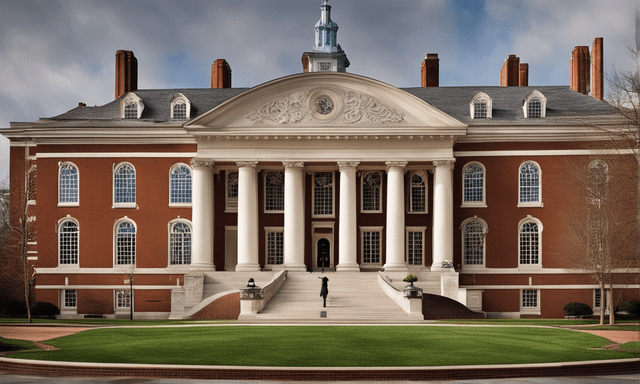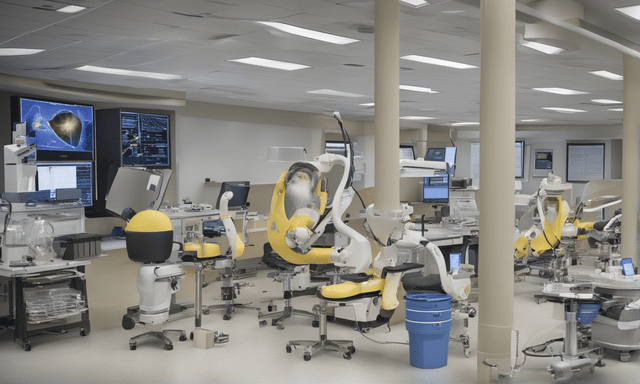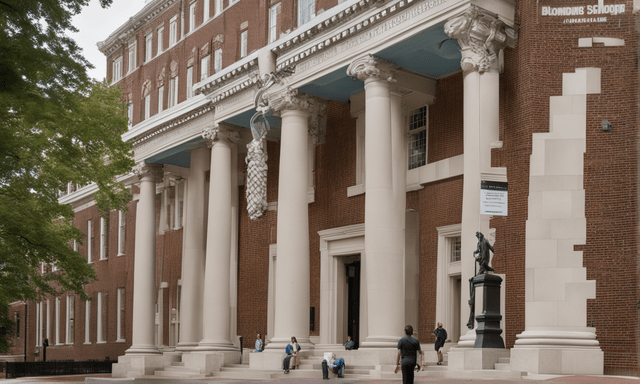Johns Hopkins University, a prestigious institution established in 1876, captivates minds across the United States with its intriguing history and academic excellence. From the very beginning, it has stood as a symbol of innovation and groundbreaking research, carving its place in the annals of higher education. Facts about Johns Hopkins University reveal a rich tapestry of achievements and contributions that have shaped not only academia but also the world at large.

Johns Hopkins University holds the distinction of being the first research university in the United States. To elaborate, it pioneered a model that emphasized the integration of research and teaching, revolutionizing the landscape of higher education, setting a standard followed by many institutions.
The university’s commitment to research is exceptional. For instance, its Applied Physics Laboratory, affiliated with the university, has been instrumental in significant contributions to space exploration, national defense, and healthcare, showcasing the institution’s far-reaching impact and innovative spirit.
Whimsical Wonders of Johns Hopkins University
Mascot Origins
The university’s mascot, a blue jay named “Jay,” may be known for its fierce spirit, but it’s rumored that it’s afraid of squirrels!
Unofficial ‘Hoptoberfest’
Students have been known to affectionately call the annual Spring Fair event “Hoptoberfest,” adding a fun twist to their celebrations.
Nerdy Chic
You’re more likely to spot students and faculty discussing quantum physics in the cafeteria than debating the latest fashion trends.
“JHU” Mystery
The university’s abbreviation “JHU” often baffles people who wonder why the “J” is necessary when “HU” seems to suffice.
Pranks and Rivalries
Johns Hopkins students have a history of playful pranks with nearby universities, like the annual “Margarine Cans in the Quad” prank with rival school, Loyola University.
The First and the Furriest
The first-ever live animal mascot in college sports history was a terrier at Johns Hopkins, starting a trend for lovable live mascots.
The Campus Cats
The campus is home to a colony of feral cats, lovingly referred to as “HopCats” by the students.
Cryptic “Aurea Hopkins”
Legend has it that a mysterious inscription by the name “Aurea Hopkins” is hidden somewhere on campus, and its meaning remains a subject of campus lore.
Also Read this: 15 Unbelievable Facts About the University of Oregon
Lesser-Known Facts About Johns Hopkins University
- Pioneering Roots: Founded in 1876, Johns Hopkins adopted the German research university model, setting the standard for academic excellence.
- Athletic Uniqueness: Despite not having a football team, Johns Hopkins excels in sports like lacrosse, proving the harmony of academic brilliance and athletic prowess.
- Medical Marvels: Johns Hopkins School of Medicine consistently ranks among the world’s top institutions, leading in groundbreaking medical innovations and discoveries.
- Fearless Jay: The university’s mascot, “Jay,” represents determination and tenacity.
- Artistic Treasures: The university houses a rich collection of art, featuring masterpieces by legends like Picasso, enriching the academic experience with artistic beauty.
- Cosmic Exploration: Partnered with the Applied Physics Laboratory, Johns Hopkins plays a key role in pioneering space exploration missions, uncovering the universe’s mysteries.
- Legacy of Compassion: Founded by the Quaker entrepreneur and abolitionist Johns Hopkins, the university upholds his commitment to knowledge, justice, and humanitarian values.
Also Read this: 25 Fascinating Fun Facts about the University of Chicago
Founder: A Visionary Philanthropist
Johns Hopkins University owes its existence to the philanthropic vision of Johns Hopkins, a remarkable entrepreneur and abolitionist. Notably, his generous bequest laid the foundation for this renowned institution, showcasing his dedication to education and community welfare.
Groundbreaking Research at JHU

The university has consistently pushed the boundaries of knowledge through pioneering research. For example, it has played a crucial role in developing the first-ever, perfectly functioning, standalone artificial heart, a testament to its commitment to innovative healthcare solutions.
World-Renowned Johns Hopkins Hospital

The affiliation with Johns Hopkins Hospital, ranked among the best hospitals globally, adds to the university’s prestige. Moreover, it has been a breeding ground for medical advancements and breakthroughs, attracting patients and researchers from around the world.
Leading in Medical Education
Johns Hopkins School of Medicine, an integral part of the university, has been at the forefront of medical education. Furthermore, it pioneered the model of combining research, teaching, and patient care, setting new standards in the field of medical training and practice.
Johns Hopkins and Space Exploration

Johns Hopkins Applied Physics Laboratory has a significant role in space exploration. In particular, it has managed and contributed to missions by NASA, like the New Horizons mission to Pluto, showcasing the university’s involvement in cutting-edge scientific endeavors.
Johns Hopkins Bloomberg School of Public Health

The Bloomberg School of Public Health, part of Johns Hopkins University, is a global leader in public health education and research. Additionally, it has been pivotal in developing policies and solutions to address public health challenges on a worldwide scale.
JHU and its Nobel Laureates
The university boasts a remarkable number of Nobel laureates among its faculty and alumni. For instance, multiple laureates have been recognized for their groundbreaking contributions to physiology, medicine, and chemistry, demonstrating the institution’s academic eminence.
Whiting School of Engineering: A Hub of Innovation
The Whiting School of Engineering is a hub for innovation and cutting-edge research. Likewise, it has significantly contributed to advancements in engineering, robotics, and computer science, fostering a culture of technological progress and excellence.
Preserving the Welch Library
The university houses the remarkable Welch Medical Library, one of the oldest and most comprehensive medical libraries in the world. In particular, it’s a treasure trove of knowledge, supporting medical research and education for generations.
Leading the Way in HIV/AIDS Research
Johns Hopkins has been a leader in research and care related to HIV/AIDS. Furthermore, it has made substantial contributions to understanding the virus, developing treatments, and addressing the global HIV/AIDS pandemic.
Impactful Johns Hopkins School of Education
The Johns Hopkins School of Education is renowned for its pioneering research and transformative approach to education. By extension, it has greatly influenced educational policies and practices, shaping the future of teaching and learning.
Peabody Institute: Nurturing Musical Talents
The Peabody Institute, affiliated with Johns Hopkins, is one of the oldest and most prestigious conservatories in the United States. Noteworthy is its role in nurturing musical talents and contributing to the world of classical music and performing arts.
Johns Hopkins and Civil Rights
The university has a historical connection with the Civil Rights Movement. For example, it actively supported and participated in efforts to desegregate healthcare and education, reflecting its commitment to social justice and equality.
The Paul H. Nitze School of Advanced International Studies (SAIS)

The SAIS at Johns Hopkins University is a premier institution for global studies and international relations. Particularly, it equips students with the knowledge and skills to navigate the complexities of an interconnected world.
Innovations in Neurology at Johns Hopkins
Johns Hopkins has been a pioneer in neurology and neurosurgery. Evidently, it has made substantial contributions to understanding the brain and developing treatments for neurological disorders, impacting countless lives.
Johns Hopkins Carey Business School: Shaping Leaders

The Carey Business School is renowned for shaping business leaders of tomorrow. Moreover, it offers innovative programs, preparing individuals to thrive in the dynamic and competitive world of business.
JHU and the Community
Johns Hopkins University has a profound impact on its surrounding communities. By and large, it engages in various community outreach programs, contributing to social upliftment, education, and healthcare for local residents.
The Hub of Biomedical Engineering Innovations
Johns Hopkins has been a pioneering force in biomedical engineering. By the same token, it has driven significant advancements in medical devices, tissue engineering, and regenerative medicine, shaping the future of healthcare.
A Global Leader in Foreign Affairs
Johns Hopkins University is a global leader in foreign affairs and international studies. In this regard, its School of Advanced International Studies (SAIS) offers programs and research that influence international policies and diplomacy.
Hub of Advanced Computer Science Research

The university’s Computer Science department is a hub for advanced research and innovation in the field. In essence, it has been pivotal in shaping the digital landscape, from artificial intelligence to cybersecurity.
Johns Hopkins and the Arts
The university fosters a vibrant arts community. For example, the Center for Visual Arts offers a platform for artistic expression, supporting emerging artists and enhancing cultural engagement on campus.
Championing Diversity and Inclusion
Johns Hopkins University is committed to fostering diversity and inclusion. By extension, it actively promotes a diverse student body and faculty, ensuring a multicultural learning environment that enriches perspectives and experiences.
Hub for Public Policy and Government Studies
Johns Hopkins excels in public policy and government studies. In particular, its School of Advanced International Studies (SAIS) offers comprehensive programs preparing individuals for impactful careers in the public sector.
Leading in Environmental Studies and Sustainability
The university has made significant strides in environmental studies and sustainability. Particularly, it conducts research and advocates for sustainable practices, contributing to a greener future.
Rich History: From Vision to Reality
Johns Hopkins University’s history is a remarkable journey. From its founding vision, it has evolved into a global academic powerhouse, leaving an indelible mark on education, healthcare, and research.
The Johns Hopkins Science Writing Program
The university offers a distinguished Science Writing Program. As a result, it equips individuals to communicate complex scientific ideas effectively, bridging the gap between science and the public.
Leading in Geriatric Medicine and Aging
Johns Hopkins is at the forefront of geriatric medicine and research on aging. Notably, its advancements in this field have contributed to improved healthcare for older adults.
Johns Hopkins and Philanthropy

The university has a rich tradition of philanthropy and community service. For instance, it actively encourages students to engage in volunteer activities, fostering a sense of social responsibility.
Johns Hopkins and International Partnerships
The university collaborates with numerous international institutions. Consequently, it enhances its global reach, facilitating cross-cultural exchanges and enriching academic experiences.
Johns Hopkins School of Nursing: Shaping Healthcare
The School of Nursing at Johns Hopkins is a leading institution in nursing education and research. Likewise, it has significantly influenced healthcare outcomes and nursing practices through groundbreaking research and education.
FAQs
Johns Hopkins University was founded on February 22, 1876.
Johns Hopkins University is located in Baltimore, Maryland, USA. It has multiple campuses, but its main Homewood campus is in North Baltimore.
Yes, Johns Hopkins University is widely regarded as a prestigious and top-tier institution. It is renowned for its strong programs in fields like medicine, public health, engineering, and the sciences.
Notable alumni of Johns Hopkins University include Woodrow Wilson, the 28th President of the United States, and Dr. Ben Carson, a renowned neurosurgeon and former U.S. Secretary of Housing and Urban Development, among many others.
The Applied Physics Laboratory is a division of Johns Hopkins University that primarily conducts research and development for the U.S. Department of Defense and NASA. It is involved in various scientific and technological projects, including space exploration, national security, and healthcare.